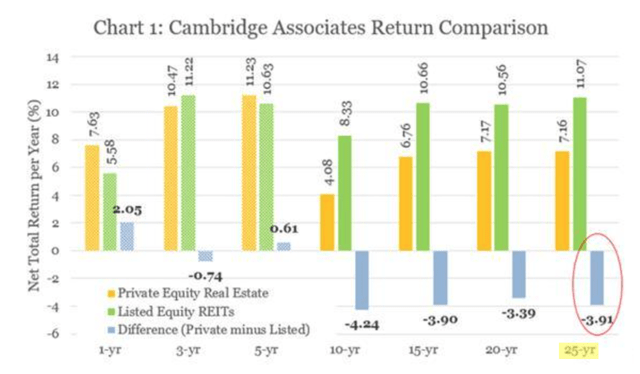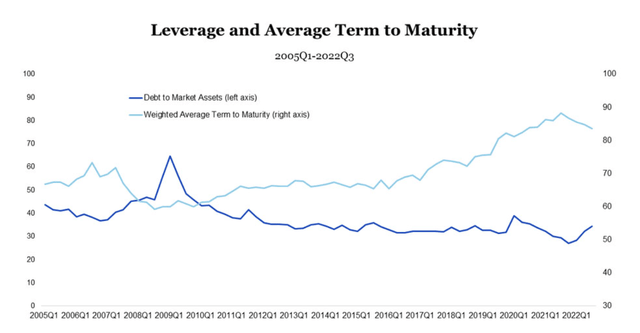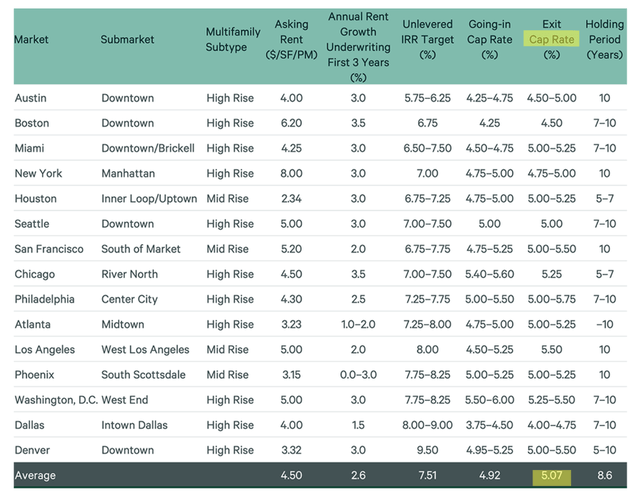Phillip Spears/DigitalVision via Getty Images
Please note that this article was produced by David Ksir who is one of our Investing Group analysts. Here, he explains in his own words why he quit private equity real estate to focus on REITs instead. This will give a different perspective from mine. Let me know your thoughts in the comment section below.
—–
I come from a private equity background.
I joined the industry right after getting my degree in finance and spent over five years working for one of the biggest private equity firms in Central Europe. My firm wasn’t nearly as big as the likes of Blackstone (BX) or Brookfield (BAM). It had about 100 employees and about $10 billion in assets under management. It wasn’t purely focused on real estate, either, with large investments in banking, insurance, healthcare, and sports betting. The real estate division, however, was one of three key pillars of the firm and was growing the fastest.
We mainly focused on the development and acquisition of residential and office buildings in the €50-150 Million range, with an occasional shopping mall, hotel, and opportunistic sale-leaseback transactions. My job was very hands-on and I got to see and handle all parts of the development process from acquiring the land and negotiating JVs, through overseeing the permitting process and obtaining bank financing, to pricing individual apartments for sale and managing the disposal of a €50+ million office project among many other things.
Most private equity, or PE, real estate firms focus on acquiring existing properties and then make money by improving the property, replacing tenants, and obtaining favorable financing conditions. My firm was different in that it mostly developed new properties. We were earning great returns, often exceeding the targeted 15% IRR on most projects. Some projects earned as much as 30-40% IRRs. Of course, these extraordinary returns came with higher risk.
But during the pandemic, I came across real estate investment trusts, or REITs (VNQ). After researching the sector thoroughly I decided to buy my first-ever REIT – Prologis (PLD). I also realized that REITs were much safer, cheaper, and enjoyed a number of advantages compared to opportunistic private equity real estate investments.
Fast-forward a couple of years and REITs are a third of my entire portfolio.
Today, I share key lessons I’ve learned while working in private equity and show why I think REITs make a much better investment for most investors, especially in the current environment.
REITs vs. private equity
Private equity real estate is being marketed as the holy grail, but its track record is not actually as good as that of REITs. Multiple studies show that over the past 20-30 years, REITs have outperformed private equity real estate by 2-4% annually.
This may be contrary to the common belief and marketing of certain private equity real estate firms which claim to target 15%+ IRR. It’s easy to forecast such high returns in an Excel spreadsheet, but there is a wide gap between projected and realized returns over the long run because risk matters.
Below are four key reasons why I prefer REITs over private equity real estate.
#1 – REITs earn far more predictable cash flows
REITs have very visible revenues and growth because their main business is holding properties and leasing them to tenants. They usually have long leases with only a small fraction of leases expiring each year. Their occupancy is therefore stable and they often have built-in rent escalation clauses that ensure a steady boost in rents. Consequently, there are very few unknowns here, short of the tenant’s ability to pay their rent.
Private equity real estate, on the other hand, is largely a transactional business. Sure, the firm may hold properties for a while and savor the same landlord benefits as a REIT, but the majority of profit is realized when the property is sold.
As a result, private equity revenues are a lot less predictable and are highly dependent on the firm’s ability to sell their properties for a profit. Needless to say, the ability to transact is highly cyclical, making private equity revenues very volatile.
And for firms that rely in large part on the development of new properties, cash flows are even less predictable due to uncertainties related to the timing of permitting, the cost of construction, interest rates, and the broader economy. This is why so many real estate developers, including very successful ones, end up eventually going bankrupt.
#2 – REITs are more conservatively financed
REITs have fairly conservative balance sheets today, with an average LTV of under 40%, long debt maturities, and mostly fixed-rate debt. This is important because it ensures stable interest expense even if interest rates stay higher for longer. Additionally, thanks to large economies of scale and access to public capital, REITs savor a lower cost of debt than most PE funds.
Private equity firms generally have much higher leverage. My firm, in particular, targeted 70% LTV on operating properties and up to 75% LTC (loan-to-cost) on construction financing. Moreover, we hedged less than 30% of total interest rate exposure. While larger private equity players may not be as aggressive, they almost always use more leverage than REITs which makes them a lot more speculative.
#3 – REITs offer significantly better liquidity
Private equity funds are not easily accessible for small retail investors. Sometimes you have to be an accredited investor to invest, and other times, there are minimum investment thresholds. The point is that getting into these funds can be difficult, and getting out is even worse.
PE funds are almost always illiquid. They tend to have 5-10-year minimum holding periods, often making it near impossible to withdraw your money early, unless you agree to sell at a major discount.
Moreover, funds have the ability to limit redemptions, if too many investors want to withdraw their money at once. We saw this earlier this year with one of Blackstone’s non-listed real estate funds.
Being stuck in an investment is never fun, and private equity funds are illiquid by design. With REITs, you have access to your money any time the stock market is open. This is a major advantage.
#4 – REITs are much cheaper today
The valuations of private equity funds and REITs are influenced by the same factors. But a big difference is that public markets are generally forward-looking and marked-to-market daily, while private fund valuations are appraisal-based and often with a significant lag. They are typically only assessed once a year by external valuers such as CBRE (CBRE), JLL (JLL), or Cushman & Wakefield (CWK).
This makes the investment seem less volatile on paper, but that’s just an illusion. In reality, your equity in these funds is likely far more volatile than that of REITs due to the higher leverage and more cyclical revenues.
Moreover, the valuation that you are paying is likely far higher than that REITs. That’s because you will be paying full price for the NAV at a time when most REITs trade deeply below their NAV.
CBRE reports that prime multi-family cap rates reached 5.07% in Q3 2023. If you invest in a private equity fund, you’re likely to pay a similar cap rate.
Meanwhile, residential REITs such as AvalonBay Communities (AVB) or Camden Property Trust (CPT) trade at implied cap rates of 6.5-7.0%.
By investing in REITs you can get exposure to the same quality real estate with more conservative leverage and at 70 cents on the dollar compared to private equity funds. This to me is the single biggest reason to pick REITs over private equity real estate today:
#5 – REITs savor better alignment of interests
Last but not least, REIT management teams are generally much better aligned with shareholders. REITs will typically have internal teams whose salaries and bonuses are tied to the performance of the stock. Moreover, since REITs are publicly traded, they’re required to supply much more detailed reporting so investors have a better understanding of what’s going on under the hood at any given time.
Private equity funds tend to be quite opaque in comparison and they are managed externally, which leads to significant conflicts of interest. To give you an example, Cardone Capital charges a 1% acquisition and a 1% disposal fee, which will incentivize the manager to trade in and out of properties. Moreover, they also charge significant management fees, which are based on the volume of assets under management. This will incentivize them to grow as much as possible, regardless of the price.
Bottom line
I enjoyed working in private equity. And during the good times, we earned exceptional returns. But now that the business cycle has turned and the high leverage, high exposure to variable rates, and the frozen transaction market pose significant headwinds. Private equity funds can be great for large limited partners that control the business but are not the best choice for small investors admire you and me.
REITs have a better track record of rewarding their shareholder, they are far safer, and above all, unlike private equity funds, they can be bought today at significant discounts to their NAVs.
It comes down to this. Why would you pay full price when you could buy an arguably superior product at a 30% discount?






